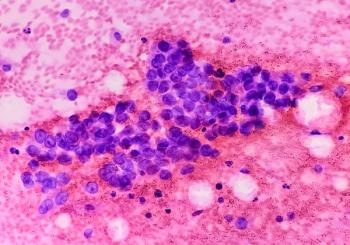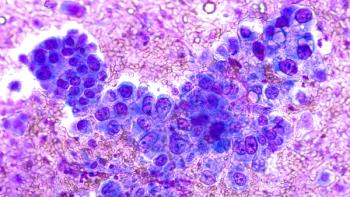
Older patients’ underrepresentation in clinical trials leaves a gap in data regarding appropriate treatment.

Older patients’ underrepresentation in clinical trials leaves a gap in data regarding appropriate treatment.

The treatment is for patients with KRAS G12C-mutant metastatic NSCLC who have previously received at least 1 systemic therapy and were not treated with a KRAS G12C inhibitor.

A majority of patients who received first-line chemotherapy switched to amivantamab-vmjw plus chemotherapy as second-line therapy.

The 10-year cumulative incidence rate was equally high between both cohorts of smoking and nonsmoking individuals.

Individuals with ischemic stroke that resided in areas with an indoor radon concentration greater than 4 pCi/L had an increased risk of developing clonal hematopoiesis of indeterminate potential.

The report allows management to provide guaranteed assessments throughout the screenings that could aid early detection, diagnosis, and lung cancer treatment.

The prospective observational study assessed a 2-year increasing lung cancer diagnosis risk, lung cancer characteristics, and the overall survival between LNP and LDCT screening.

The results support perioperative nivolumab as a potential new treatment option.

Immune cells in lung cancer are connected to allergic conditions found in eczema and asthma.

Repotrectinib is a tyrosine kinase inhibitor (TKI) that targets ROS1 and is administered as an oral therapy for treatment of locally advanced or metastatic ROS1-positive non–small cell lung cancer.

How patients acquire NSCLC plays a role in health outcomes, with never-smoker patients having genetically different disease than the same disease in smokers.

Compared to chemotherapy alone, amivantamab plus chemotherapy treatment with and without lazertinib had also demonstrated positive trends in OS and ORR in patients with NSCLC.

Compared to osimertinib alone, first-line treatment with amivantamab plus lazertinib was also shown to improve progression-free survival and have an increased duration of response.

Compared to placebo plus chemotherapy, nivolumab plus chemotherapy had also improved event-free survival and both pathological complete response and major pathologic response rates.

Compared to chemotherapy alone, amivantamab plus chemotherapy had a better objective response rate and prolonged progression-free survival and overall survival.

The novel combination met the co-primary endpoints of progression-free survival and overall survival during the CheckMate -901 trial, also demonstrating sizeable improvement in objective response.

Not only did taletrectinib shrink tumors in 92% of patients who were tyrosine kinase inhibitor -naïve, but 89.5% of patients continued to respond to treatment at 12 months.

The fast pace of information can make it difficult to efficiently apply data to care.

The statistically significant and clinically meaningful improvement in disease-free survival is “practice-changing” and may represent a “paradigm shift” in treatment, according to experts.

Integrating immunotherapies will continue to improve patient outcomes and quality of life.

PLCOm2012 uses additional parameters to predict the risk of lung cancer and was found more effective when identifying both Indigenous and non-Indigenous individuals with lung cancer.

Pembrolizumab (Keytruda) gains its sixth approval in non–small cell lung cancer (NSCLC), with the latest indication in combination with platinum-containing chemotherapy as neoadjuvant treatment, and then continued as a monotherapy for the post-surgical adjuvant treatment of patients with resectable NSCLC.

Mental health treatment may be necessary when SAEs occur.

Trial data bolster the role of nivolumab and nivolumab-based combinations in both early and metastatic stages of multiple cancer types, especially in patient groups with high unmet needs.

Encorafenib (Braftovi; Pfizer Inc) and binimetinib (Mektovi; Pfizer Inc) approved for the treatment of patients with metastatic non-small cell lung cancer who harbor a BRAF V600E mutation.